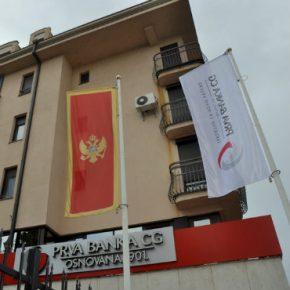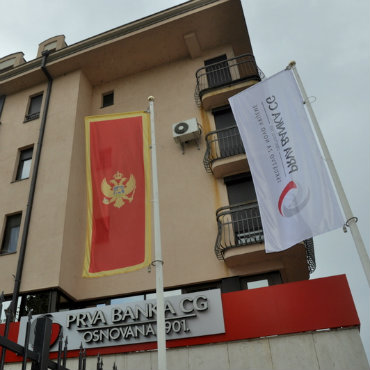Tydzień w gospodarce
Category: Trendy gospodarcze
Analyst in the Balkan Department at the Institute of Central Europe in Lublin, Poland

Podgorica, Montenegro (Roberto Maldeno, CC BY-NC-ND)
Montenegro has a small market of just above 600 thousand of inhabitants and GDP per capita (ppp) USD15,600. Distanced from the major markets, with poor infrastructure, it has managed to preserve a specific clan-based structure of society, politics and economy.
The best example and symbol of the clanarchy is Milo Dukanović, the former President and Prime Minister, who, with some small breaks, held the power in the country from 1991 to 2016.
Recent audit of the Prva Banka Crne Gore (First Bank of Montenegro) confirms that the state has been still captured by Dukanović and his family. The bank is owned by Aco Dukanović, the brother of Milo. According to the external control conclusions, the Montenegrin government, state-owned companies and public institutions, as well as self-government units (municipalities) hold in this bank over EUR97m, which constitutes around one third of the all deposits held there. For comparison, the overall income from the customs amounted last year to EUR310m, from VAT EUR200m and from concessions EUR100m.
Elektroprivreda Crne Gore, national energy company, holds in the First Bank EUR43,8m, the state owned companies EUR18,4m, municipalities EUR13,2m, central government EUR12,5m, regulatory agencies EUR3,5m, Investment and Development Fund EUR2,5m, Health Fund EUR2,4m, claims Montenegrin daily Vijesti.
In 2008 the government saved the Prva Banka from insolvency by providing EUR44m as a form of assistance. The data in possession of the MANS Research Center in Podgorica shows that assistance to Prva Banka was a first step to the state’s indebting. In 2007 (a year after declaration of independence from Belgrade) the budgetary surplus amounted to EUR172m. In the following years the government would continue to lend money to Prva Banka and some other private businesses. Another example would be transfer of most of the money received from privatization in 2009 (EUR107m), which has been deposited in Prva Banka.
Maybe that is why the Association of Banks of Montenegro believes that discussed in the Montenegrin parliament the Law on Banks should define that all data that is considered as a bank secrecy should be submitted to the Central Bank, the competent judicial authorities, the police, the Tax Administration, notaries, public executives, bankruptcy administrators and liquidators, and a foreign bank with a participation in capital or voting rights of at least 50 per cent.
So far, the data was available only upon receiving permission of the client of the bank. As such the financial sector in Montenegro was everything but transparent. Existing legal regulation does not recognize the bank management as managing institution, therefore legal liability of such organs is limited, i.e. personally no one is directly responsible for miscalculations or frauds.
The signal of necessity to strengthen the state supervisory powers over the banking sector show how uncompetitive and grey is the financial sector in Montenegro.
Other Balkan states’ leaders are convinced that the form is far more important that the content. The EU has visibly given up the quality of the reforms for the sake of political stability and keeping the European influence.
Jan Muś is a lecturer at Vistula University

